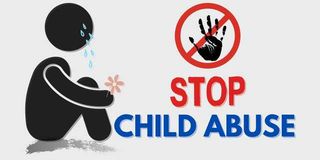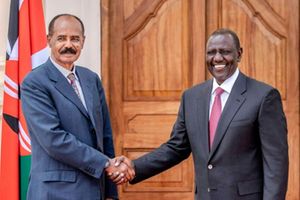Premium
Don’t ‘mind your business’ if you see a child being abused

Child abuse can either be subjecting children to physical, emotional or psychological conditions that violate their rights as envisioned in the Children’s Act.
“While browsing through various social media apps, you are likely to see comedy sketches or memes about parenting. From hilariously terrible ‘dad jokes’, and funny and innocently refreshing baby videos, to ‘overwhelmed’ parents using satire to make merry of their children’s messes, the internet has it all.
Such common comedy sketches relatable to a lot of us are videos juxtaposing growing up in a black family as pertains to discipline, vis-à-vis white households. Even in Western culture, people of African descent stand out when it comes to instilling discipline in their children physically.
Growing up, much like any other child, I would every now and then find myself on the wrong side of the law; the law, in this case, being my parents. Despite futile attempts to hide from the dread of the slipper or the cooking stick turned disciplining tool, I would receive the occasional thrashing to correct my moral heading when verbal warnings proved not to be enough.
Indulge me as I recount one such occurrence. I was 10 years of age and in class five at the time, when a mischievous spirit paid me a visit and guided me to ripen a few avocados in my mother’s suitcase packed full of white bed sheets. My intent was to check them a few days later, but as it happened, I forgot. I cannot recall how long it had been but by the time my mother discovered them, they were rotten and had stained her precious sheets. As you might well suspect, I shed some tears that day. Looking back now, for this and all the other days I cannot remember, I am a better person for it.
So bearing this in mind and knowing it is the same upbringing experienced by most, I did not pay much attention a short while back when I found a boy being whipped by a woman who I assumed to be his mother close to my area of residence. But what had initially seemed like just a normal ‘banter’ between a boy and his mum turned extremely violent very fast.
I turned back upon the boy’s increased wailing to see him lying on the ground, the woman now kicking and punching him. I hesitated for a while, perhaps my eyes were deceiving me; surely no adult would beat a child in such a manner. But when the woman took the boy by his right leg and started dragging him on the hard ground deaf to the child’s cry for help, I knew I had to intervene.
To paint a picture, neither the boy nor the mother was known to me, I had never even seen either one of them prior to this. So the question on my mind was; under what authority was I supposed to intervene? I decided to go through one of the security guards outside the apartment who was also watching on in horror. Fortunately, he knew the woman and he managed to get the boy away from her, albeit with some bit of commotion.
Here I was with a child clinging to my arm crying uncontrollably, trying to calm him down to establish what was going on. The boy just kept saying “ataniua” (she will kill me), and even after he had finally calmed down some 20 or so minutes later, he was refusing to go back home. He was pleading with me to go with him to my place saying the mother was waiting for him in the house to beat him some more. I must admit at that moment I felt heartbroken and powerless, dumbfounded even on what to tell the eight-year-old.
With the promise to check on him the following day, he finally agreed to be taken to their apartment by the security guard, and I silently walked to my place. I was very disturbed by what I had just witnessed. My thoughts were racing, wondering what was happening with the boy. On the one hand, I had now established the woman was actually his mother. So even if I was to report the incident, who was I supposed to talk to? I picked up my phone and called my colleague who advised me to engage the children’s office, as well as try to find out more about the situation.
So the next morning, I spoke to a few neighbours who knew the two, as well as neighbours from the family’s previous residence (she had just moved two months prior) and all of them, shared similar accounts. I contacted a children’s officer, who informed me the best course of action would be to report such a case to the area chief and police to ensure necessary steps were taken to safeguard the child’s rights.
I was facing a moral dilemma. I knew now from more than five witness accounts that the woman of South Sudanese descent and mother of four was frequently and violently beating the boy. But despite the people, I spoke to know, none of them had ever reported her, and one could argue out why. Suppose I reported her and she lost custody of her children with their father regularly away for business in South Sudan, would it be a guarantee that they would have a better life? Was I involving myself in a situation that I should not have? But what about the boy’s welfare? Was I not obliged to take action having witnessed the violence myself?
Eventually, I made my way to the chief’s office where I had a candid conversation with him recounting what I had witnessed and my findings upon further enquiry. Joses Ntwiga (the chief) took up the matter with a lot of concern noting how disturbed he was as he was a parent himself. He summoned two village elders who are part of the ‘nyumba kumi’ initiative who he sent to the woman’s house to establish the facts and check up on the boy.
Quizzed by the two representatives as to what had transpired the previous evening, and the alleged cases of abuse, the woman said his third-born child was quite hard-headed, and the beating I had witnessed was because the boy had run away from home the previous day without notice, and had spent the night at his uncle’s place who lives nearby. She watered down her version of events saying she had just beaten him with a slipper (I had witnessed otherwise, and the boy bore minor bruises as evidence), saying that despite everything she loved all her children very much.
As an alternative to engaging the police and having her arrested, an amicable solution was reached that the chief’s office would regularly and randomly check up on them to ensure the child was not being abused, and the woman’s details and contact information were taken. All parties involved felt this was the best course of action.
When I sat down to ponder and reflect on all that had transpired, several questions came to mind. How has the concept of disciplining children evolved over the decades to our current society? And what is society’s place in protecting the welfare of children and in reporting cases of child abuse? To delve deeper into this, I spoke to two parents and asked them to share their experiences growing up, and now as parents. I also engaged a children’s officer to define what qualifies as child abuse, and the reporting process and actions to take if one witnesses a case of child abuse.
Debrah Akoth, 30 – mother to a two-year-old girl

Debrah Akoth, 30, poses for a photo during an interview with Nation in Ruiru, Kiambu County on February 20, 2023.
“I grew up in a family of seven children, and I am the fifth born. I would not say I was the renegade in the family, but I still received countless beatings as a child. A particular instance I remember is when I was around eight years.
Back then, finances in the family were a bit tight, providing for seven children was no easy task for our parents. So when my mother bought a mobile phone, it was quite a joy for the family. I still remember the phone brand was Phillips, the big old ones with an aerial. We were allowed to see it and touch it, but only under supervision. One day, I decided to take the phone and play with it as there was no one around, or so I thought. When my mother found me, I dropped the phone in a panic to not get caught, and the aerial broke off. I received the beating of a lifetime, and I could not understand why my mother would do such a thing just because of a phone.
However, looking back, I realise that she would always spell out the reasons why she was beating us whenever it happened, and then later she would treat us to a nice meal or some snacks. Despite being strict with us, she would always treat us with love, something I believe is very important especially in our current society.
As parents we are dealing with a lot; from challenging economic times, mental health issues or even disagreements between spouses, and sometimes we take out our frustrations on our children. I believe it is critical to be conscious of this as parents, as the way we handle our children will determine the kind of adults they become. Excessive violence does not rectify behaviour, in fact, it will probably harden the child and make them withdrawn.
When it comes to society’s responsibility in protecting children’s welfare, I believe everyone has a role to play. A memory comes to mind of a family that was our neighbour during my teen years. A woman had died and she had left behind a small boy. The father remarried and the new wife was the typical abusive step-mum to the child, unbeknown to the husband. When my mother learnt what was happening she stepped in and eventually the necessary steps were taken to resolve the matter.
It is easy to be disconnected in our current society; we are all busy and overwhelmed with our own endeavours and we lack enough time even for our children leave alone those of our neighbours. There is also the notion of ‘minding your own business’ even when you know something is not right. However, we must never be complacent. We can intervene to protect a child where there is a need, and still do so without overstepping. It all depends on how you approach the situation, and whether you engage people with wisdom.”
Tabitha Mwangi – mother to a seven-year-old girl

Tabitha Mwangi, a resident of Murang'a County and mother to a 7-year-old girl on February 27, 2023.
“If I could use two words to describe my mother it would be a strict disciplinarian. She would never beat us without reason, and sometimes my siblings and I would wrong and she would just let it go. But when she decided to thrash us she would do so thoroughly. If you cried she would continue till you stopped, and if you did not cry she would cane you some more because she would say you are being hard-headed.
I grew up in such a time when if the neighbour found you in the wrong, they would cane you then take you home and report you to your parents. It was a harsh and strict kind of upbringing, but it instilled a lot of respect and order in us.
Having a child of my own now, I may not necessarily subject her to what I went through, times have changed. But I am still a strong believer in instilling a strong sense of discipline in children. There are those who say the best way to correct a child is by showing them love and affection, but disciplining your children does not mean you hate them. In fact, you do it because you love them, but it should not be out of anger. It also teaches them responsibility and respect for others. The point is not to inflict pain on the child, so even if you pinch a child, make sure they understand why they are being reprimanded and show them what the right thing is.
When it comes to collective responsibility for children, it goes beyond protecting children against violence. As a society, sometimes we are quick to judge and condemn other people. If for instance, we see children indulge in drugs or drop out of school, we label the parents as negligent without trying to find out the root of the problems and offering solutions. I think we need more empathy in dealing with each other and realise that just because it is not my child, it does not mean I do not bear a responsibility to protect their interests.”
Robert Muema – Deputy Director, Family and Children Services, Nairobi

Child abuse can either be subjecting children to physical, emotional or psychological conditions that violate their rights as envisioned in the Children’s Act.
“Child abuse can either be subjecting children to physical, emotional or psychological conditions that violate their rights as envisioned in the Children’s Act.
If any person has knowledge of that, they should be obliged to take measures to protect the interests of the child. Existing reporting lines include the police, children’s offices, local authorities (chiefs and assistant chiefs), as well as any other government office that deals with children’s welfare.
After reporting a case of child abuse, the relevant authorities will take up the matter for investigation, and if the evidence is found then further steps are taken. The perpetrator(s) will be arrested and arraigned in a court of law for legal action, and the child taken to foster care or placed with alternative caregivers such as family relatives.
These measures are aimed to be temporary, however, especially in foster care. If a parent who was found guilty of abuse, for instance, undergoes rehabilitation successfully, then they can go back to a court of law to instigate the process of getting back custody of their child.
Where possible, arbitration through local authorities is also a solution. Parenthood can be challenging, especially in today’s society where people are facing a lot of social and economic pressures. Ultimately, the goal is to uphold the family unit while protecting the child’s interests and well-being.
In terms of societal engagement, urbanisation has made maintaining communities much more challenging, unlike in rural areas where people are more connected. However, cohesion initiatives such as the ‘nyumba kumi’ initiative can bridge this gap. If for instance, a child goes missing, the whole neighbourhood will be involved in looking for the child. This kind of unity can be achieved even without calamity, and create socially friendly communities for our children to grow up in.”




